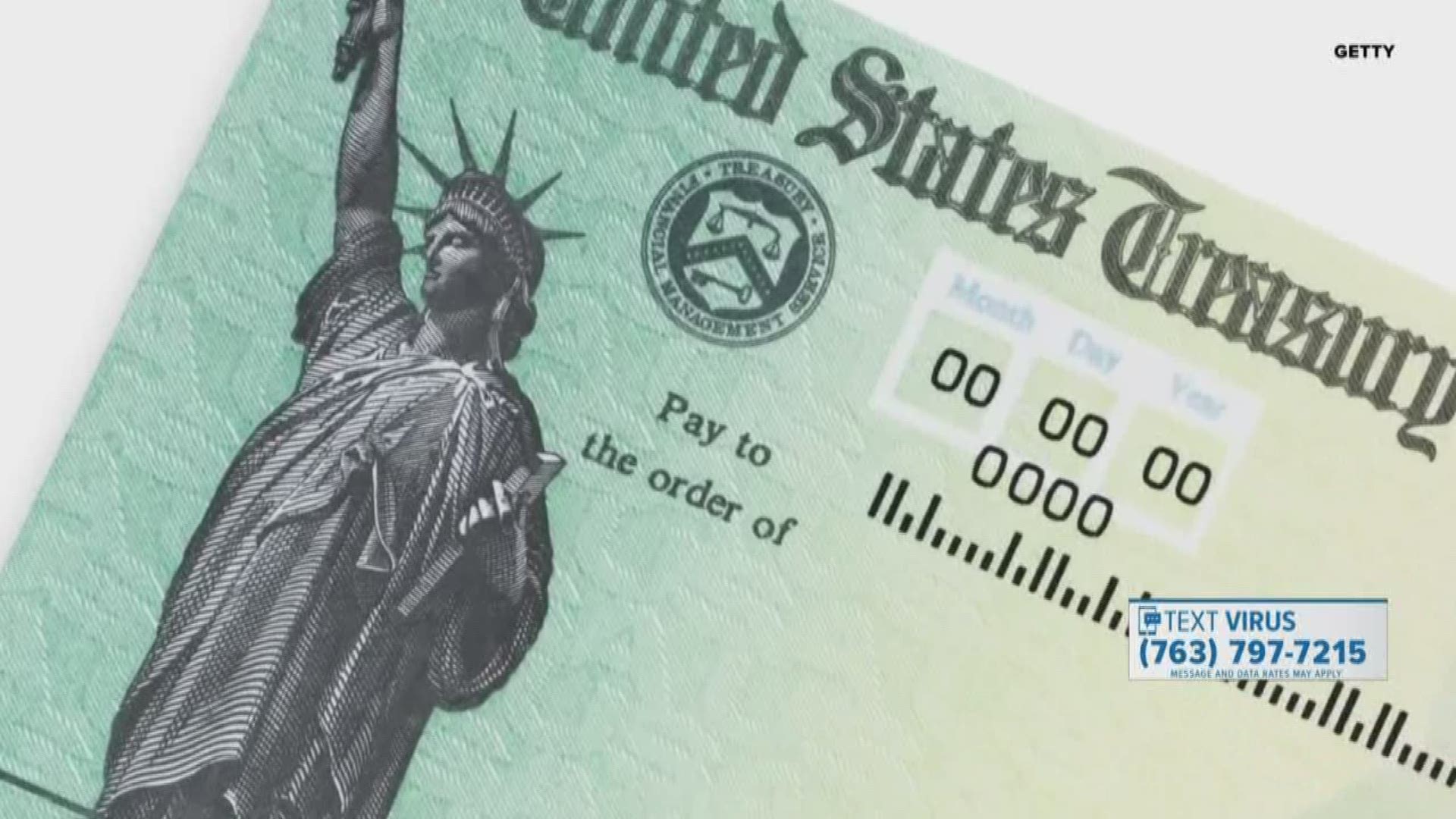MINNEAPOLIS — We've been getting a lot of questions about those stimulus checks folks are expecting to get later this month.
It's not every day the government cuts you a check, no questions asked, so it's natural that people would have their own questions.
We gathered some of the tougher queries we got from our viewers and asked the experts.
Laura Bereiter from White Oaks Wealth Advisors was kind enough to lend us her expertise.
QUESTION: Who gets these checks?
ANSWER: Individuals with adjusted gross income of less than $75,000 are eligible to receive up to $1,200. Joint filers, like married couples, are eligible to receive up to $2,400 if their adjusted gross income is less than $150,000. Both of those groups can receive up to $500 per qualifying child as well.
If you make more than $75,000 individually or $150,000 jointly, you’ll receive less money until you reach the threshold of $99,000 for individuals and $198,000 for couples. After that you won’t receive anything.
Q: What are those numbers based on?
A: It is your adjusted gross income, and for most people their adjusted gross income is their wages or their salary less any pre-tax deductions, like 401k contributions or health insurance that their employer pays for and takes out of their check. Other gains, like dividends and capital gains, will also play into that number as well.
Q: So, if you make $80,000, but you have $6,000 or maybe $7,000 in some of those pre-tax deductions (like 401k) you might still get the full benefit?
A: Yes, you would. The IRS is using 2019 tax filings to come up with those numbers. If you haven’t already filed your 2019 tax return, the IRS will use your 2018 return in its place.
Q: If you’re retired will you still get a check?
A: Yes, as long as you have retirement income that falls within the thresholds of receiving the tax credit, either the full amount or a partial amount, you are eligible. The treasury reversed course and confirmed that individuals who receive Social Security benefits, who don't typically file tax returns, will NOT have to file a simplified tax return. Instead, payments will be sent to those individuals based on the Social Security system records.
Q: Is there any sort of an age limit for these checks?
A: No. There is not.
Q: What about people who don't file taxes, like people who have a low income or others who don't typically file taxes?
A: One of the challenges is for the elderly, lower income people, or people that just traditionally don’t need to file tax returns, because not everyone is required to do that, is that the IRS doesn’t know how much income those individuals have or if they even exist in the taxpaying sense. Those people will need to file a simplified tax return. That form is not yet available for filing and doesn’t exist yet, but those individuals will need to do that to get their check. The Treasury just recently changed it so that Social Security recipients don't have to fill out this extra paperwork, so there's a strong chance others might not have to fill this out either. The Treasury is still finalizing their full plan, so things could change.
Q: When is that form expected to come out?
A: We don’t have a timeline for that yet. I know they are working on it.
Q: How will I get my money?
A: If the IRS has direct deposit information on file, they will send it there. They will use information from your latest tax return. If they don’t have this information, they will just mail you a check.
Q: When will I get my money?
A: The federal government is telling us within about three weeks they will start sending out those checks.
Q: When it comes to that $500 for each child or dependent, is there an age limit?
A: There's a bit of confusion on the definition of a qualifying child. At this point, a qualifying child is 16 years old or younger. For those who are ages 17-23 that are dependents of their parent(s), meaning that the parent provides more than 50% of the child's support, there would be no payment to the child or the parent. It's unclear if we will see any adjustment made to that, but it's not out of the realm of possibility given that other changes continue to be made.
Q: What if a woman is pregnant right now, can she get money for that dependent later on?
A: You are not allowed to claim a child on a tax return until they are born. That individual would be able to claim that child when they do go through the 2020 tax filing season and they would get the $500 at that point. So, yes, they would be able to receive that $500 later on.
Q: How are we as a nation paying for all of this?
A: That has yet to be seen. I know the $2 trillion number can be scary for a lot of people. Decisions need to be made as to how to do that and those decisions just haven’t been made yet.
Q: Could we see higher taxes in coming years because of this?
A: That has been a resource used in the past to deal with excess spending and helping control the budget deficit and our nation’s debt, but it’s unclear how or when that will happen.

